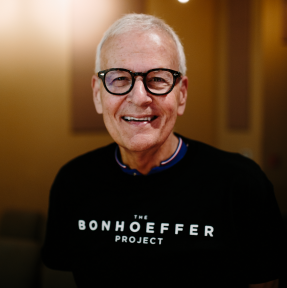
HISTORY
A WORD FROM THE COFOUNDERS
The goal of The Bonhoeffer Project is to encourage each participant to become a disciple making leader. Once that decision has been made, to then provide the participant with the knowledge necessary to carry out a plan for making disciples who also will make disciples. The Bonhoeffer Project firmly believes that this is best done in a community of like-minded persons—that is why the project itself is a community.
Bill Hull
Co-Founder
In 2014, sixty-eight-year-old Bill Hull and thirty-four-year-old Brandon Cook decided to join forces to solve a problem and start a movement. The problem was that the predominate gospel being taught in the American church made it almost impossible to make Christlike disciples. They determined that the gospel Americana is that you can become a Christian but not necessarily follow Jesus. This divided salvation into two parts, conversion and discipleship. It is being preached that conversion is necessary, but discipleship is optional. This is what Dietrich Bonhoeffer called “cheap grace.” This gospel made popular in the mid 1800’s, remains the norm; it has become a cultural artifact. This has led to the Gospel being replaced by the plan of salvation. It has created a difficulty for church leaders who understand the problem but now must persuade those who have been converted to take up the mandate of discipleship as part of their salvation contract. The gospel being preached today is largely focused on self, is centered on forgiveness only, promotes prosperity, and primarily asks the question, “How am I doing?” This is not the life into which Christ has called us. A Christlike disciple lives for others, is engaged in mission, and takes up his cross by putting aside selfish ways.
Brandon Cook
Co-Founder
As Bonhoeffer said, “Jesus was a man for others; we as his disciples then are to live for others.” That is why it is almost impossible to make Christlike disciples from our non-discipleship gospel. The gospel you preach and live determines the disciples you make. Hull and Cook decided to start small and think big. The decision was to work with “fourth soil” leaders who would yield a 30, 60, or 100% increase. They knew that a movement must begin with men and women who have been changed. As a result, they began establishing cohorts of 5 to 8 leaders in 2015. At that time, Bill and Brandon led two cohorts. In 2016 they and newly trained leaders led seven cohort. 2017 & 2018 saw exponential growth with 21 and 29 cohorts, respectively. The Bonhoeffer Project has multiplied rapidly in little more than six years with over 100 cohorts to date.
What has caused this increase? God is doing a good work through these cohorts. In one year, the members of a cohort will meet for about four hours each month for 10 sessions. In between meetings the leaders work on projects they are given, complete the assigned reading, and communicate with their Cohort Leader. The first third of the year is focused on changing minds, the WHY of things, with the focus on the Gospel itself. The goal is to have the members wrestle with the concept in their context and adopt a gospel that includes discipleship as an integral part of being saved. The middle third of the year places the focus on changing hearts. This is built around the definition of a disciple and how to go and make disciples. How would you know one if you made one? This is the WHAT. The last third of the year is centered on the HOW. The leader will then work on developing a plan that will fit into their context and will have an opportunity to work.
It is expected to take four to five years to create the environment and infrastructure which will enable the local congregation or ministry to become a disciple-making movement. Therefore, additional year cohorts are provided. In year two, a leader can return to a cohort and become an apprentice coach. Another option is the issue of a satisfied soul. Many of the leaders are too restless and not grounded enough to be disciple-making leaders. As presented above, cohorts deal with the WHY, WHAT, and HOW. Now the WHO has been added by examining what God is doing in the leader. This is based around the reality that if you are to deconstruct the gospel, the ministry infrastructure and the leader must also be deconstructed.
There are many ways to enhance and develop the work on discipleship. In 2020, The Bonhoeffer Project launched two virtual cohort beta groups and will be offering this as an option for all participants by the fall of 2021. These virtual cohorts will provide the full Bonhoeffer experience in a virtual setting. Participants can learn at their own pace & connect with others from all over the globe.
The Bonhoeffer Project has over 30 faculty represented in our National Leadership Team, Regional Representatives, Cohort Leaders, and administrative support staff across the United States and abroad. We are expanding globally at a rapid pace and currently have cohorts in progress in Argentina, Cameroon, the United Kingdom, and India. In the near future, we will also be launching cohorts in Kenya, Lithuania, Mexico, South Korea, and Russia.
“All who are called to salvation are called to discipleship, no exceptions, no excuses.”



